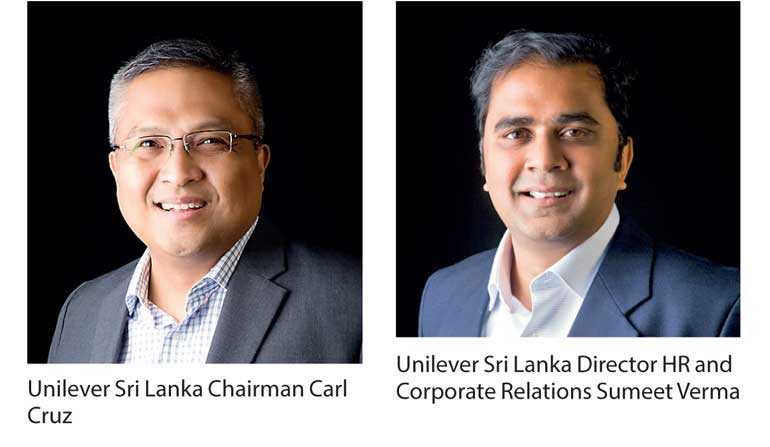Thursday Feb 19, 2026
Thursday Feb 19, 2026
Wednesday, 10 October 2018 00:00 - - {{hitsCtrl.values.hits}}
 The 2018 edition of the annual symposium of the Employers’ Federation of Ceylon (EFC) will unfold this November under the banner ‘Shaping the Future of Work’.
The 2018 edition of the annual symposium of the Employers’ Federation of Ceylon (EFC) will unfold this November under the banner ‘Shaping the Future of Work’.
The symposium will comprise four technical sessions on the topics ‘Impact of Digitalisation and Automation’, ‘Challenges of Transition’, ‘Future of Work We Want’ and ‘Managing Diversity and Inclusion’.
In a bid to raise the bar for employee relations in the country, a dialogue of this nature is imperative, noted Unilever Sri Lanka Chairman Carl Cruz.
As the principal sponsor of this year’s symposium, Unilever Sri Lanka joins hands with the EFC to bring together some of the notable business personalities in the country to deliberate on collective action required to gear the country towards future business.
“Robust discussions and experience-sharing have the potential to inspire solutions. At this forum we can expect to learn how different or similar our approaches to these relevant subjects are and how we can tailor-make solutions that befit us,” remarked Cruz.
Organisations need to embrace the reality of the ever changing dynamics of work and in this context, they are required to “disrupt themselves, rather than getting disrupted by another player,” added Unilever Sri Lanka’s Chairman.
Sri Lankan organisations, as he elaborates, need to realise that the environment is changing and the pace of change will only continue to increase with technology. Companies that are able to pre-empt this change will win, but those that will continue to bask in past ways of working will end up being left behind, he warns.
A sense of purpose for organisations too is increasingly becoming important as more and more consumers show affinity towards businesses that operate with a larger purpose in mind as opposed to those which are merely transactional, opined Cruz. In addition, organisations need to build talent for the future through talent development and campus engagements, he suggests.
Sri Lanka’s strengths in facing this transition are many, pointed out Cruz, who cites infrastructure, high literacy rate, mobile penetration and female work force participation as positive factors.
“Sri Lanka has the ingredients for successful transition, what we need to focus on, is leadership intent which is driven by purposeful business that entails sustainable business models to cater to the consumers.” The country’s encouraging entrepreneurship climate too needs to be exploited further, remarks the senior professional. Extending entrepreneurship beyond startups, Cruz urged all companies to create the environment for innovation and ownership.
The role of HR management in the face of changing dynamic of work, is to lead the change to convert challenges into opportunities, remarked Unilever Sri Lanka Director Human Resources and Corporate Relations Sumeet Verma.
Impact of automation on employment and the way we work, multigenerational workforce and diversity are key areas of focus here and the EFC’s upcoming symposium, can spur a robust dialogue in this regard, he said.
This inevitable change also calls for leadership that could energise people, said Verma. “CEOs today should look at their jobs as Chief Energy Officers. “Many companies make the mistake of delegating such transitions to HR without complete leadership commitment. These transitions are critical to the business agenda that may be enabled by a strong HR team, but also need to be driven, from the front, by the business leaders.”
While opportunities are abundant for the growth of the workforce, which is enabled by the transition, at the same time, it is imperative to clearly communicate to the employee, the positive approach to embrace the change, noted the HR professional.
“Companies, from the very top leadership to the last man on the shop floor, client site or market must see the change as an opportunity to simplify the way we do business and enhance our efforts to serve our consumers. This will have a direct impact on the success of the business. From an individual or employee perspective, those who take ownership and focus on continuous learning are the ones who will be able to ride and lead the wave of change.”
A discourse such as that of the EFC’s upcoming symposium will help build a deeper understanding of the common trends impacting the world of work, said Verma. “The Sri Lankan consumer is well connected and informed and expects competitively priced products/service of high quality with high speed. The resources available to the organisations are quite similar too; e.g. talent pool in Sri Lanka. Therefore, it helps to sit together and discuss ideas and practices so that we determine the best approach for ourselves to turn these seemingly complicated challenges into opportunities to unlock growth.”